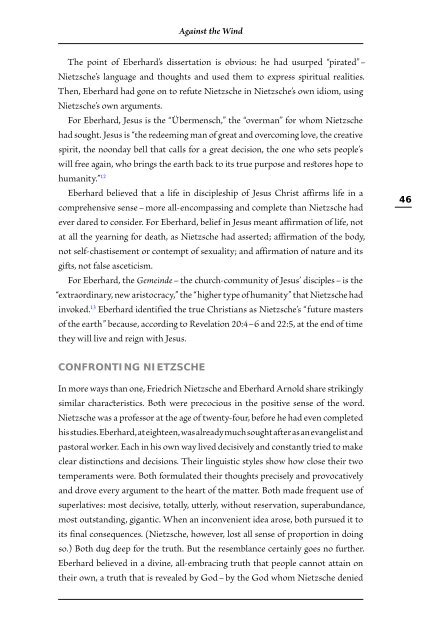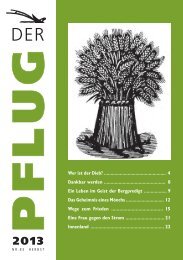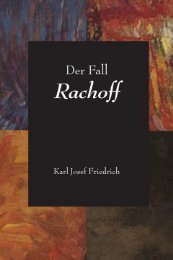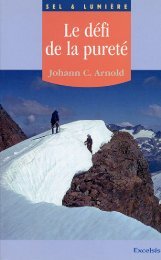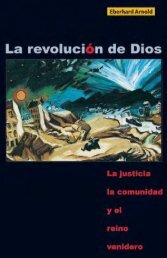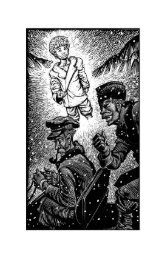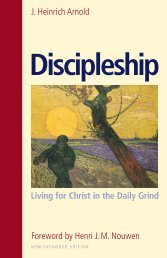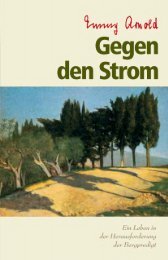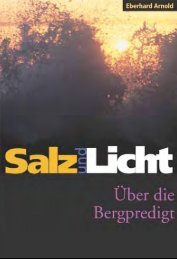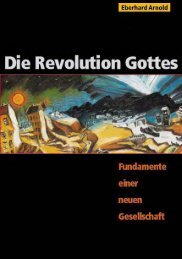Against the Wind: Eberhard Arnold and the Bruderhof - Plough
Against the Wind: Eberhard Arnold and the Bruderhof - Plough
Against the Wind: Eberhard Arnold and the Bruderhof - Plough
You also want an ePaper? Increase the reach of your titles
YUMPU automatically turns print PDFs into web optimized ePapers that Google loves.
<strong>Against</strong> <strong>the</strong> <strong>Wind</strong><br />
The point of <strong>Eberhard</strong>’s dissertation is obvious: he had usurped “pirated” –<br />
Nietzsche’s language <strong>and</strong> thoughts <strong>and</strong> used <strong>the</strong>m to express spiritual realities.<br />
Then, <strong>Eberhard</strong> had gone on to refute Nietzsche in Nietzsche’s own idiom, using<br />
Nietzsche’s own arguments.<br />
For <strong>Eberhard</strong>, Jesus is <strong>the</strong> “Übermensch,” <strong>the</strong> “overman” for whom Nietzsche<br />
had sought. Jesus is “<strong>the</strong> redeeming man of great <strong>and</strong> overcoming love, <strong>the</strong> creative<br />
spirit, <strong>the</strong> noonday bell that calls for a great decision, <strong>the</strong> one who sets people’s<br />
will free again, who brings <strong>the</strong> earth back to its true purpose <strong>and</strong> resores hope to<br />
humanity.” 12<br />
<strong>Eberhard</strong> believed that a life in discipleship of Jesus Christ affirms life in a<br />
comprehensive sense – more all-encompassing <strong>and</strong> complete than Nietzsche had<br />
ever dared to consider. For <strong>Eberhard</strong>, belief in Jesus meant affirmation of life, not<br />
at all <strong>the</strong> yearning for death, as Nietzsche had asserted; affirmation of <strong>the</strong> body,<br />
not self-chastisement or contempt of sexuality; <strong>and</strong> affirmation of nature <strong>and</strong> its<br />
gifts, not false asceticism.<br />
For <strong>Eberhard</strong>, <strong>the</strong> Gemeinde – <strong>the</strong> church-community of Jesus’ disciples – is <strong>the</strong><br />
“extraordinary, new aristocracy,” <strong>the</strong> “higher type of humanity” that Nietzsche had<br />
invoked. 13 <strong>Eberhard</strong> identified <strong>the</strong> true Christians as Nietzsche’s “future masters<br />
of <strong>the</strong> earth” because, according to Revelation 20:4–6 <strong>and</strong> 22:5, at <strong>the</strong> end of time<br />
<strong>the</strong>y will live <strong>and</strong> reign with Jesus.<br />
Confronting niEtZSChE<br />
In more ways than one, Friedrich Nietzsche <strong>and</strong> <strong>Eberhard</strong> <strong>Arnold</strong> share strikingly<br />
similar characeristics. Both were precocious in <strong>the</strong> positive sense of <strong>the</strong> word.<br />
Nietzsche was a professor at <strong>the</strong> age of twenty-four, before he had even completed<br />
his studies. <strong>Eberhard</strong>, at eighteen, was already much sought after as an evangelist <strong>and</strong><br />
pastoral worker. Each in his own way lived decisively <strong>and</strong> constantly tried to make<br />
clear distinctions <strong>and</strong> decisions. Their linguistic styles show how close <strong>the</strong>ir two<br />
temperaments were. Both formulated <strong>the</strong>ir thoughts precisely <strong>and</strong> provocatively<br />
<strong>and</strong> drove every argument to <strong>the</strong> heart of <strong>the</strong> matter. Both made frequent use of<br />
superlatives: most decisive, totally, utterly, without reservation, superabundance,<br />
most outst<strong>and</strong>ing, gigantic. When an inconvenient idea arose, both pursued it to<br />
its final consequences. (Nietzsche, however, lost all sense of proportion in doing<br />
so.) Both dug deep for <strong>the</strong> truth. But <strong>the</strong> resemblance certainly goes no fur<strong>the</strong>r.<br />
<strong>Eberhard</strong> believed in a divine, all-embracing truth that people cannot attain on<br />
<strong>the</strong>ir own, a truth that is revealed by God – by <strong>the</strong> God whom Nietzsche denied<br />
46


